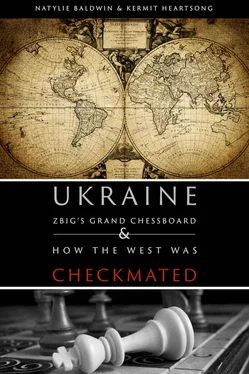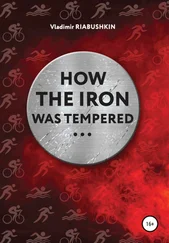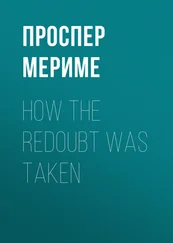Kermit Heartsong - Ukraine - ZBIG's Grand Chess Board & How The West Was Checkmated
Здесь есть возможность читать онлайн «Kermit Heartsong - Ukraine - ZBIG's Grand Chess Board & How The West Was Checkmated» весь текст электронной книги совершенно бесплатно (целиком полную версию без сокращений). В некоторых случаях можно слушать аудио, скачать через торрент в формате fb2 и присутствует краткое содержание. Год выпуска: 2015, Жанр: Политика, на английском языке. Описание произведения, (предисловие) а так же отзывы посетителей доступны на портале библиотеки ЛибКат.
- Название:Ukraine: ZBIG's Grand Chess Board & How The West Was Checkmated
- Автор:
- Жанр:
- Год:2015
- ISBN:нет данных
- Рейтинг книги:4 / 5. Голосов: 1
-
Избранное:Добавить в избранное
- Отзывы:
-
Ваша оценка:
- 80
- 1
- 2
- 3
- 4
- 5
Ukraine: ZBIG's Grand Chess Board & How The West Was Checkmated: краткое содержание, описание и аннотация
Предлагаем к чтению аннотацию, описание, краткое содержание или предисловие (зависит от того, что написал сам автор книги «Ukraine: ZBIG's Grand Chess Board & How The West Was Checkmated»). Если вы не нашли необходимую информацию о книге — напишите в комментариях, мы постараемся отыскать её.
Ukraine: ZBIG's Grand Chess Board & How The West Was Checkmated — читать онлайн бесплатно полную книгу (весь текст) целиком
Ниже представлен текст книги, разбитый по страницам. Система сохранения места последней прочитанной страницы, позволяет с удобством читать онлайн бесплатно книгу «Ukraine: ZBIG's Grand Chess Board & How The West Was Checkmated», без необходимости каждый раз заново искать на чём Вы остановились. Поставьте закладку, и сможете в любой момент перейти на страницу, на которой закончили чтение.
Интервал:
Закладка:
On the other hand, the Eastern Ukrainians voted to free themselves of oligarchs and not a single neo-Nazi would be seen or heard. Fairness, absence of corruption, and a judicial system run by the people would be exactly what the new leadership proposed for the people of the Donbas.
These are the elections that the West has continuously deemed “illegal,” “illegitimate,” and “militarily provocative.” Yet the irony of the West is clearly stated by Dmitry Linnik, head of the London Bureau of The Voice of Russia , who opined on the show Cross Talk:
There is one other thing that I’d like to evoke in connection with legitimacy or otherwise. If we could go… rewind back slightly to 1999. We’ll recall that the West was out to support the desire of Kosovo. Well, a majority of the population, obviously, against Belgrade. So what did it [the West] do? It mounted a military campaign against Belgrade to secure the right of the people of Kosovo to a vote for independence. Now if we draw a parallel with the situation in Ukraine, the course would be for military action against Kiev, which is suppressing East Ukraine’s right to a vote for independence. (RT 2014)
As the host, Peter Lavelle commented on the above, “well that would be logical, and Washington doesn’t know logical.” No, it appears that Washington knows only illogic and cynicism.
Since October, Russia has been forced to cope with a combination of factors that have proven more troublesome than the West's original sanctions: the precipitous drop in oil prices and the parallel devaluation of the ruble.
As a result, Russians are facing a higher inflation rate and a major slowdown in the economy that is expected to culminate in a slump for at least the first half of 2015 (Weafer 2014). However, as usual in the Western mainstream media, hefty amounts of misinformation and hyperbole abound regarding the consequences for Russia. One can almost see the media pundits closing their eyes in childlike fashion and wishing hard for their repeated predictions of Russia's imminent demise — with Putin being yanked out of the Kremlin as he gulps a cyanide capsule — to be true.
The first point of misinformation being bandied about, with Paul Krugman as its most noteworthy disseminator, is the idea that Russia has dangerously high debt liabilities. However, Krugman did not distinguish in his analysis between Russia's government debt and corporate debt. Russia's current government debt is actually only $57 billion. The rest of the $377 billion cited by Western commentators and analysts involves Russian corporations that the state has a stake in but for whose debt the government is not liable (Hellevig 2014).
Furthermore, neither the Russian state nor the Russian corporations involved are at risk of a default (Aris 2014). As we have outlined in this book, Russia has kept a healthy financial balance, holding $400 billion in foreign reserves and gold in addition to rainy day funds and budget surpluses. Russia is actually a creditor nation to the world.
Another point of misinformation involves the implications of the ruble devaluation. While low oil prices and a devalued currency are certainly not a good thing for Russia, the fact that they are happening in tandem protects the Russian budget and trade balance. Hence, the Russian government will have no problem keeping its pension and salary payments in line with inflation for the foreseeable future, ensuring the support of Putin's voting base.
It should also be noted that China and Russia have a currency swap agreement. China has already publicly stated that if the ruble crisis should become perilous and if the Russian government requests it, China will step in and bolster the ruble (Durden 2014).
Putin, for his part, has signaled his opposition to using up financial reserves to support the ruble as well as the use of capital controls, instead allowing the currency to float in order to protect the budget and provide a “soft stimulus for domestic manufacturers,” that have seen healthy growth in 2014 (Weafer 2014; Aris 2014).
The Russian government actually has some opportunities in this crisis that can be exploited if it plays its cards right, such as supporting the growth of small-to-medium-sized businesses and domestic manufacturing as Putin discussed in his 2014 Annual Address to the Federal Assembly. But this would require the ruble to stabilize even if it is at a low value (Aris 2014).
Some wealthy Russians are showing their support by repatriating assets to Russia and borrowing in order to invest in import substitution (Reuters 2014; Aris 2014).
The reaction of the Russian people has ranged from stoic to sanguine. This is partly due to the fact that they have a history of enduring far worse privation and suffering, which they have shown to be quite willing to bear when they see themselves as under attack by outside forces. It is also due to the vast majority of Russians living entirely within the “ruble zone,” having no personal financial relationship to other currencies, and Russian legal guarantees of deposit amounts well above what most Russians hold in a bank account — that is, of the small percentage of Russians who even have a bank account as most hoard any extra money (RBTH 2014).
As of December 2014, according to an AP/NORC poll, most Russians still felt their country was moving generally in the right direction and were optimistic about their personal financial future, while Putin still enjoyed an 81 percent approval rating (Bhadrakumar 2014).
And what of World War III? It would appear that the priests and priestesses of the Church of the Grand Chessboard may, indeed, have their apocalyptic coming to god moment.
As of November 5, 2014 the Ukrainian army has once again begun intense shelling across the Donbas, inflicting growing civilian casualties and damage to infrastructure. As detailed by reporter Graham Phillips:
Yesterday Kiev ramped the war back up with non-stop shelling across the entire front in Donbass. In Donetsk where the shelling has never stopped, two children were killed and 4 wounded at school #63. in Donetsk. Among others killed in other shelling at Donetsk was a ten year old girl and her grandmother. They were shredded by an artillery shell direct hit. (RT 2014)
Readers will not hear this news in the Western mainstream media. Readers will also not be made aware of the fact that, as the war escalates in the Ukraine, the probability of World War III escalates as well. And know this with certainty, as a reader you will not be informed by your President, Prime Minister, Congress or Parliament when the flash point is reached. Instead, readers will be informed by the “facts” on the ground as well as those “facts” exploding above their heads.
However…
If the “crazies,” as referred to by George Herbert Walker Bush, the fundamentalist high priests and priestesses can be contained, thwarted, removed, there is every possibility that the military powers that be (the Pentagon, NATO) are extremely concerned about waging a war against an emergent and technologically superior Russia.
“Superior, on what basis?”
In a little-known event in the Black Sea in April 2014, the West, the US in this particular case, was given a ringside seat as to what Western military would face should they attempt to strike Russia.
In the article, “What Frightened the USS Donald Cook So Much in the Black Sea?” we learn that the power and might of one of the US Navy’s most sophisticated ships, the USS Donald Cook, a fourth generation guided missile destroyer was literally outmaneuvered in every respect.
But first what are the capabilities of such a ship? As itemized below its key weapons are:
Tomahawk cruise missiles with a range of up to 2,500 kilometers, and capable of carrying nuclear explosives. This ship carries 56 Tomahawk missiles in standard mode, and 96 missiles in attack mode. (Voltaire 2014)
Читать дальшеИнтервал:
Закладка:
Похожие книги на «Ukraine: ZBIG's Grand Chess Board & How The West Was Checkmated»
Представляем Вашему вниманию похожие книги на «Ukraine: ZBIG's Grand Chess Board & How The West Was Checkmated» списком для выбора. Мы отобрали схожую по названию и смыслу литературу в надежде предоставить читателям больше вариантов отыскать новые, интересные, ещё непрочитанные произведения.
Обсуждение, отзывы о книге «Ukraine: ZBIG's Grand Chess Board & How The West Was Checkmated» и просто собственные мнения читателей. Оставьте ваши комментарии, напишите, что Вы думаете о произведении, его смысле или главных героях. Укажите что конкретно понравилось, а что нет, и почему Вы так считаете.











